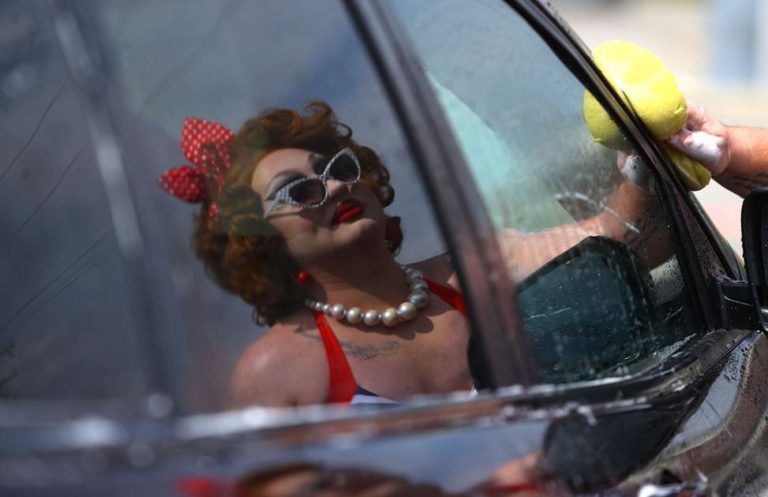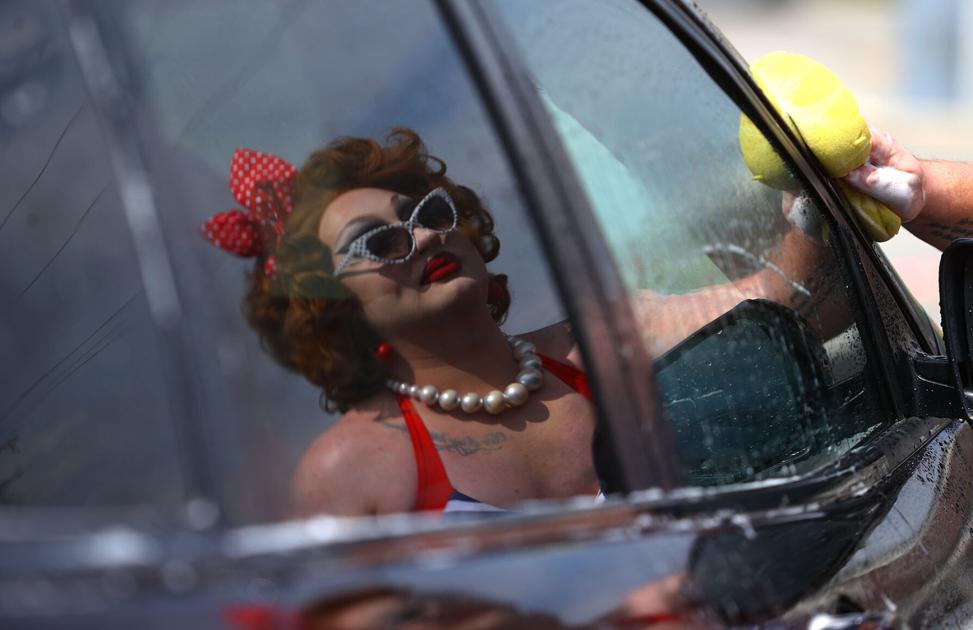

After a day of suds and sun at the Kokomo Pride Second Annual Drag Queen Car Wash, the celebration of Pride Month continued in a more serious fashion with an LGBT panel.
Celebrated throughout the month of June, Pride is a time dedicated to the LGBT (lesbian, gay, bisexual, transgender, queer and others) community coming out, being proud of their identities and celebrating how far the community has come.
The origin of Pride is the Stonewall Riots. In the early hours of June 28, 1969, New York City police raided the Stonewall Inn, a gay club in New York City. The riots served as a catalyst for the gay rights movement in the U.S. and around the world.
The panel, “Pride: Why We Celebrate,” hosted by Kokomo Pride on Sunday afternoon, tackled topics such as racism, transphobia, homophobia and more in the community room at Sun King Kokomo. The panelists included Paul Novak, Glinda B. Fierce, Will Bellindir, Jinx Kidwell, Roger Faine, Jennifer Kuepper and Alex Smith. Austin Mariasy, director of Kokomo Pride, moderated.
The panel began with Mariasy asking the panel why they celebrate Pride.
“I celebrate Pride because it’s an act of resilience and self-preservation,” Fierce said. “It’s more than just rainbows and glitter. It’s something we fought for, it’s something we still fight, a continuation of that fight. It’s something to never be comfortable about, and it’s something I cherish.”
The panel tackled difficult topics, one of which was the use of the word “queer.” In the past, queer has been used as a derogatory term against the LGBT community, but is now used to describe a member of the LGBT community. Fierce said that using the word is an act of the LGBT community taking the power back from oppressors.
“When I hear queer, it’s all of us,” she said. “It’s every person in our army.”
Panelists talked about how hostility and hatred toward their identities became more severe over the past four or five years. Novak said he noticed the change at the beginning of former-President Donald Trump’s term in office.
“I’ve noticed more things being said to me than I have since high school … “ he said. “Fortunately, nothing has ever been physical, but it’s almost like there’s just a mindset, in the past few years, of permission to act that way, to be hostile.
“It’s not ok,” he said. “It’s never appropriate. It’s fine if you don’t understand our community, or if you weren’t brought up around certain people. But that’s not permission to say derogatory things or be violent toward them.”
Like Novak, Faine said he’s dealt with hatred within the last few years. He said he experienced a hostile work environment because he is a gay man, dealing with microagressions and fear of retaliation.
“You’re scared, you’re afraid they’ll fire you,” he said. “I didn’t really realize the stress of what I was going through until they actually said the words, ‘You’re fired.’”
Faine said he was sad and upset, but he also felt relief.
“It was really kind of a serene thing, this peace came over me,” he said. “You know what, they’ve done their worst. And I’m still standing.”
Bellindir brought up the 2020 attempt by Indiana Attorney General Curtis Hill to review the decision that same-sex couples should have the same rights as other couples to be named as parents on birth certificates. The U.S. Supreme Court denied the case in December 2020.
“We’re still going to keep fighting because those things (legal protections) are still in questions … ,” he said. “Until there’s not a single person out there who thinks that we’re less than, we’re still going to keep fighting for our equal rights.”
The conversation moved toward the violence against the transgender community. According to the Human Rights Commission (HRC), 44 people died from violence or attacks for being transgender or gender non-conforming in 2020. As of May 11, 28 people have died in 2021, according to the HRC.
“With transgender people in our community being disproportionately victimized and murdered, it just blows my mind,” Novak said. “Until stuff like that stops happening, you can’t talk to me about equal rights.”
Fierce was one of the participants in the Drag Queen Car Wash. She sat on the panel, still in drag and talked about the meaning of drag to the LGBT community. Fierce became emotional talking about drag queens, kings and non-binary performers. Novak stepped in and said that queens are on the frontlines.
“It’s entertaining, it’s political, it’s confrontational,” he said. “We would not be where we are today without the drag community for sure.”
Fierce was the last to speak on the topic of drag. She shared that she performed the weekend after the Pulse nightclub shooting in Florida, and her friends told her not to perform because they feared for her safety. She wiped tears as she spoke Sunday.
“I realized I didn’t have a choice because as a drag queen, we’re putting everything on the line,” she said. “And I decided that I’d rather die in drag than not go in.”
Bellindir said that while gay marriage is legal, there’s still a long way to go. And Pride isn’t going anywhere.
“We’re done with being tolerated, we need to be celebrated,” Bellindir said. “We’ve been through a hell of a lot and we’re not done talking about it.”